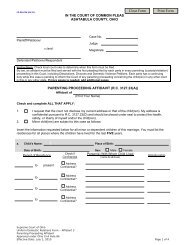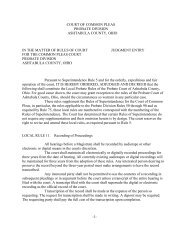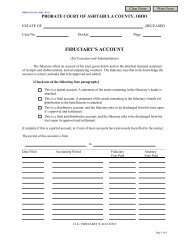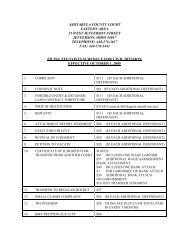Civil Information - Ashtabula County Courts System
Civil Information - Ashtabula County Courts System
Civil Information - Ashtabula County Courts System
Create successful ePaper yourself
Turn your PDF publications into a flip-book with our unique Google optimized e-Paper software.
<strong>Ashtabula</strong> <strong>County</strong> Court, Eastern Area<br />
<strong>Civil</strong> division<br />
The civil division handles civil case disputes involving dollar amounts up to fifteen thousand<br />
dollars ($15,000.00); landlord/tenant disputes, including evictions and rent escrows; collection of<br />
judgments via garnishments; debtor trusteeships and appeals to the bureau of motor vehicles for<br />
driving suspensions. It is recommended that you contact an attorney for advice in filing these<br />
matters.<br />
Small claims are civil disputes involving monetary amounts up to three thousand dollars<br />
($3,000.00).<br />
What is small claims court?<br />
Every municipal court and county court in Ohio has a small claims division, known as the<br />
“small claims court”. The purpose of the small claims court is to resolve minor disputes fairly,<br />
quickly, and inexpensively. No one needs a lawyer in small claims court, but anyone can have a<br />
lawyer if he or she wishes. A corporation pursuant to ORC 1925.17 should have a attorney represent<br />
it in small claims. The procedure in small claims court is much simpler than in “regular” court.<br />
(“regular court” includes the general division of the county court, and the general division of<br />
common pleas court.) in small claims court: hearings are informal; there is no jury; cases are<br />
decided by the court judge; court costs are much lower than in regular court, etc.<br />
What cases can the court handle?<br />
A small claims court can handle most claims for money damages of $3,000.00 or less, and<br />
counterclaims, and cross-claims of $3,000.00 or less. Small claims cases are like other lawsuits,<br />
except the amounts involved are too small to make the expense of suing in regular court worthwhile.<br />
The kinds of claims filed in small claims courts include, for example, claims by tenants to recover<br />
security deposits; claims by landlords for unpaid rent or damage to their property; claims by buyers<br />
for damages for defective merchandise; claims by business people and tradespeople for unpaid bills;<br />
claims by automobile owners for damage sustained in minor accidents; claims by employees,<br />
babysitters, maids, and handy persons for unpaid wages. Also, governmental entities can file certain<br />
claims in small claims court. In summary, small claims court is a forum which can handle, and<br />
resolve, most common disputes which involve modest monetary claims. There are limitations on<br />
the claims that small claims can handle. First, the claim must be for money only. For example, a<br />
small claims court cannot issue restraining orders or injunctions, or grant divorces. Second, not<br />
counting court costs and interest, a claim cannot exceed $3,000.00 and, if filed, a counterclaim or<br />
a cross claim cannot exceed $3,000.00. Third, regardless of the amount involved, a small claims<br />
court cannot handle certain lawsuits. For example, a small claims court cannot handle lawsuits based<br />
on libel, slander, and malicious prosecution. Lawsuits seeking punitive or exemplary damages; or<br />
lawsuits brought by an assignee or agent. (Governmental entities can bring certain lawsuits through<br />
an agent.) fourth, claims against certain entities, for example, the agencies of the state of ohio, or<br />
the united state government and its agencies, cannot be handled by a small claims court. Fifth, where<br />
a counterclaim or cross-claim in excess of $3,000.00 is filed, the court will transfer the case to the<br />
regular court docket. Sixth, the court may transfer a case to regular court upon motion (written<br />
request to the court) of a party against whom a claim, counterclaim, or cross-claim is made, or upon
the motion of a third party defendant (a person or entity not in the original case who was added to<br />
the case after the case started.)<br />
Who can sue or be sued?<br />
In general, but with important exceptions, anyone can sue or be sued. A person, or entity,<br />
committing, or receiving, a legal wrong or injury can sue or be sued. The general rule is that any<br />
individual, company, business, or organization can file a claim or have a claim filed against him, her,<br />
or it. A minor under 18 can use the court through his or her parent or guardian. The person who<br />
files the claim is called the “plaintiff”, and the person against whom the claim is filed is the<br />
“defendant”. As noted above, claims against the agencies of the state of ohio or against the united<br />
states government, or its agencies, cannot be handled by a small claims court. In general, claims<br />
against the agencies of the state of ohio may be handled by the court of claims of ohio located in<br />
Columbus. The court of claims of ohio has an administrative determination procedure for claims<br />
of $2,500.00 or less. <strong>Information</strong> about the court of claims of ohio is available from the clerk of the<br />
court of claims. May claims for civil wrongs against united states government agencies may be<br />
handled administratively under the federal tort claims act. <strong>Information</strong> about this procedure,<br />
including the form used to file such claims, is available from the federal agency involved.<br />
Where do I file my claim?<br />
Your claim must be filed in the small claims division of the municipal court or county court<br />
having “jurisdiction”. A small claims court has “jurisdiction” if the transaction or incident on which<br />
your claim is based took place in that court’s geographical territory. Regardless of where the<br />
transaction or incident took place, a small claims court also has jurisdiction if the defendant (or any<br />
one defendant, if there is more than one) lives, or has his, her, or its principal place of business in<br />
the court’s territory. Check the territorial boundaries of each court that appears to have jurisdiction.<br />
Be sure to file your claim with the proper court, the court that has jurisdiction. You can do this by<br />
calling the clerk of the court which appears to have jurisdiction and asking whether this court has<br />
jurisdiction over your claim. It is necessary for the court to give the defendant official notice that<br />
he, she, or it is being sued. The clerk of the court serves such notice by mail, or has the notice served<br />
by an officer of the court. You must give the clerk the defendant’s complete name and address so<br />
this notice can be served. If you do not know where the defendant lives or works, you may, in some<br />
circumstances, be able to give notice of the filing of your claim by publication. However, small<br />
claims courts cannot give notice by publication. If you must use publication, file your claim in the<br />
general division of the court.<br />
How do I file my claim?<br />
A lawsuit on a small claim is begun by filing a formal statement of claim with the small<br />
claims court. A statement of claim must contain a description of the nature and amount of your<br />
claim, plus certain other information. In most courts, you make this formal statement by completing<br />
and filing a form called a “small claims complaint”. Some court use a statement form called a “small<br />
claims information sheet”. Before you file the formal claim, it is a good idea (but not required) to<br />
make a last effort to settle the dispute. You can do this by sending the potential defendant(s) a letter
y certified mail, return receipt requested. Your letter can be elaborate or simple. At a minimum,<br />
your letter should summarize the basic facts of your claim and state the amount of money you want.<br />
After reading your letter, the defendant might pay the claim or offer a sensible compromise. If the<br />
defendant does not settle the claim, call or go to the clerk of the court which appears to have<br />
jurisdiction. That is, the court in whose geographical territory the transaction or incident took place,<br />
or the court in whose territory the defendant (or any one defendant, if there is more than one) lives,<br />
or has his, her, or its principal place of business. Explain the basic facts of your claim, for example,<br />
who, what, where, when and how much money you want. Then ask the clerk if the claim can be<br />
properly filed in his or her court. If the clerk says the claim can be filed in his or her court, ask about<br />
the details of filing a claim. Be sure to ask about: the court’s business hours; the cost of filing a<br />
small claims case; and the name and complete mailing address of the clerk’s office for the small<br />
claims division of the court. Finally, ask for directions on how to get to the court. If the clerk says<br />
your claim cannot be filed in his or her court, ask for the name, address, and telephone number of<br />
the proper court, and contact the clerk of that court. When you go to the clerk’s office, take the<br />
following with you: 1) the full name (and business name if applicable), address, and telephone<br />
number of the defendant; 2) whatever evidence you have which supports your claim; 3) the names<br />
and addresses of all your witnesses; and 4) enough cash to pay the filing fee. Also, you should find<br />
out whether the defendant is on active military service. (Federal law provides some protection for<br />
those who are on active duty, and the court will ask about defendant’s military status.) some<br />
example of evidence are: sales receipts, contracts, leases, warranties, promissory notes, IOU’s,<br />
diagrams, photos, memos, notes, letters, postal return receipts, and unclaimed letter notices. Be sure<br />
to fill in the small claims form completely. Use clear language. Write or print legibly. On the<br />
complaint, state the nature, circumstances, and amount of your claim as briefly as possible. If you<br />
want interest on any judgment and reimbursement for all court costs, be sure to ask for your<br />
damages, interest on your damages, and reimbursement of all court costs, including those incurred<br />
in enforcing a judgment. If you win, you may be able to recover damages, interest, and all court<br />
costs.<br />
What does it cost?<br />
There is no uniform filing fee for small claims courts; the amount of the filing fee varies from<br />
court to court. Each court sets its own filing fees. The filing fee may not cover all the cost of your<br />
claim. For example, costs may be higher if: there is more than one defendant; notice of the filing<br />
of the claim is served upon the defendant by an officer of the court or sheriff’s department rather<br />
than by mail; some witnesses will not come to the court hearing voluntarily and have to be<br />
subpoenaed (officially ordered by the court to come to the hearing); cross-claims have been filed;<br />
additional parties have been added; further court action is necessary to collect the money awarded.<br />
If you ask for reimbursement of all court costs, damages, and interest, and you win, you may be able<br />
to recover the filing fee, the cost of serving the notice, subpoena costs, and those incurred in<br />
enforcing a judgment, along with your damages, and interest on your damages.<br />
I’ve been sued! What do I do now?<br />
The court will send you official notice that someone has filed a claim against you. The notice<br />
and its attachments will given you important information. For example, the notice and its
attachments will state the identity and address of the plaintiff, the basis and amount of the claim, and<br />
the date and time you must appear at that court to defend the claim. Further, the official notice will<br />
contain instructions on how you should respond to plaintiff’s claim. Once you have received this<br />
official notice, you have several options. Come of these options are mentioned below. If the<br />
plaintiff’s claim is fair, you may pay the plaintiff the full amount of the claim, plus court costs, and<br />
that will be the end of the matter. If part of the plaintiff’s claim is fair, you may admit that part of<br />
the claim and deny the rest. If plaintiff’s claim is completely unfair, you may deny that you owe<br />
anything. Further, if you believe the plaintiff actually owes you money, you may answer the claim<br />
with a claim of your own called a “counterclaim”. If the plaintiff has named multiple defendants and<br />
you have a claim against one of those defendants, you should consider filing a cross-claim against<br />
that defendant. (A cross-claim is generally a claim filed by one defendant against a second<br />
defendant.) if persons who are not parties to the original claim are necessary for a complete<br />
determination of the lawsuit, you may ask the court to have tem brought in as parties. For example,<br />
plaintiff may have named you as the only defendant where another person or entity is involved. You<br />
may request the court to bring in such other person or entity by making a third-party complaint (or<br />
claim). Ask the clerk about filing cross-claims and third-party claims if you have such claims.<br />
What if the claim is settled before hearing?<br />
You must contact the clerk if you decide not to go through with the formal hearing (trial).<br />
Write or call the clerk as soon as you decide not to go through with the hearing. Tell the clerk the<br />
case number of your claim and the reason for cancellation. In general, it is the plaintiff’s<br />
responsibility to notify the clerk whenever a claim is cancelled. <strong>Courts</strong> generally look to plaintiffs<br />
for payment of court costs where claims are cancelled. Thus, where a defendant offers to pay the<br />
entire damage claim, plaintiff should ensure that such payment includes reimbursement for all court<br />
costs that have been incurred, for example, the filing fee, the costs of serving notice, etc. Of course,<br />
a plaintiff may accept a payment which does not include such costs in order to settle the claim.<br />
How do I prepare my case?<br />
Whether you are the plaintiff or defendant, your job at the formal hearing (trial) is to give the<br />
judge the facts, and convince the judge that he or she should decide in your favor. Before the<br />
hearing, you should assemble your evidence, contact your witnesses, and make a written outline of<br />
your case. As a defendant, you can have the claim moved to regular court if you do not want it<br />
handled in small claims court. However, if the claim is moved to regular court, court costs will be<br />
higher, and you may need an attorney. Your evidence may include: your testimony; the testimony<br />
of witnesses; anything in writing; any tangible thing, such as the faulty merchandise on which your<br />
claim, or defense, or both is based; photos or diagrams of the damage, or the scene of the incident,<br />
etc. Please note that evidence includes testimony, documents, and things. In summary, anything that<br />
can support your case may be useful as evidence. Certain kinds of testimony may be especially<br />
useful. For example, a professional repairman could be a good witness when poor or incomplete<br />
workmanship is an important question. Friends, neighbors, or bystanders who are familiar with the<br />
incident or transaction , or some aspect of the incident or transaction, may be witnesses. Contact<br />
your witnesses before the hearing, make sure they agree to come to the hearing and testify, and make<br />
sure they know the time and place of the hearing. If a witness will not voluntarily come to the
hearing and testify, you can have the court order the witness to come to the hearing, to issue a<br />
subpoena to that witness. Ask the clerk of the court how to request the issuance of a subpoena. You<br />
may have to make an additional deposit with the court to pay for the costs of the subpoena. It is<br />
necessary and appropriate to talk to witnesses. You have to ask them what they know, and if they<br />
will come and testify. When you talk to witnesses, tell them to testify truthfully. When you have<br />
gathered your evidence, including your testimony and the testimony of other witnesses, make a<br />
written outline of the points you wish to make in presenting your claim or defense. List your<br />
evidence and witnesses in the order you wish to present them. A good way to present your version<br />
of the incident or transaction is in the sequence it actually happened. Present your evidence,<br />
including any testimony, just like you would tell a story. In this way, the separate bits of testimony<br />
and other evidence will fit together and make a complete, easily understandable summary of the<br />
incident or transaction.<br />
What is mediation?<br />
Some courts use mediation. It is a process whereby parties to a dispute meet with a neutral<br />
third person, a mediator, to resolve their disputes. A mediator is not a judge, and will not decide if<br />
either party is “right” or “wrong”, and will not force any party into accepting a settlement that is not<br />
agreeable to them. When a small claims case has been filed, it is the policy of this court to refer<br />
appropriate matters to mediation prior to trial. Parties may also voluntarily schedule a mediation<br />
session prior to filing a small claims action. To do this, simply inform the clerk of your desire to do<br />
so. The clerk will schedule a mediation session and will notify all parties of the date.<br />
How does mediation work?<br />
The court will notify both parties of the scheduled mediation date. If the case has been filed,<br />
this date will be one or two weeks before the trial date. At the mediation session, the parties will sit<br />
down with the mediator in a private setting. After the mediator has explained the process, the parties<br />
will each explain the dispute as they see it. The mediator then helps facilitate discussion between<br />
the parties and makes sure that each party is given an opportunity to be heard. The parties are then<br />
encouraged, the help from the mediator, to generate a variety of options for settlement of the dispute.<br />
No settlement will be imposed on the parties unless both parties agree. When agreement is reached,<br />
it may be reduced to writing and filed with the court, and will become a court order.<br />
Why mediate?<br />
Agreements reached through mediation can provide a remedy tailored to the needs and<br />
interests of the parties in a way a court imposed judgment cannot. The parties are always in control<br />
of the outcome of the mediation. Because the process is voluntary, either party may end the process<br />
at will. And because a mediated settlement focuses on a “win-win” settlement, the parties feel much<br />
better about the outcome. During the mediation, the parties may learn communication and skills<br />
which can be helpful to them in resolving problems in the future. There is no risk to trying the<br />
mediation process - no one gives up the right to continue their action in court if the dispute is not<br />
resolved.
What if I do not appear at the hearing/trial?<br />
Failure to appear at the hearing on the merits is more than bad manners; if you fail to appear,<br />
you might immediately lose regardless of the merits of your claim or defense. If a party does not<br />
show up at the hearing, and that party has not given the judge a good reason, the judge has the<br />
discretion of allowing or not allowing another hearing. The judge can, and quite possibly will,<br />
decide the case in favor of the party who attended the scheduled hearing. If you cannot attend the<br />
hearing on the date the court has scheduled, you may file a motion/request for continuance. The<br />
judge will decide whether or not your request is granted.<br />
What if I win or lose?<br />
<strong>Courts</strong> have various ways of letting your know how the claim was decided. These ways can<br />
vary from court to court and claim to claim. The judge may state his or her decision at the end of<br />
the hearing, or may state that he or she will issue a written decision at a later date. In any event, the<br />
official decision (judgment) is part of the court’s records. If you disagree with the judgment, you<br />
should decide whether you wish to appeal the judgment, ask the judge to reconsider the decision, etc.<br />
The practice varies from court to court. If you wish to appeal, you should immediately contact the<br />
clerk of the court which issued the judgment. Ask the clerk whether you can appeal. Time limits<br />
are short for appealing. If you wish to appeal find out what the time limits are and take the required<br />
steps within the time limits. The court’s judgment should address all claims. The losing party on<br />
any of these claims is a “judgment debtor”. Additional action can be taken against the judgment<br />
debtor if the judgment is not paid promptly. If you have lost and believe the judgment is fair (or do<br />
not want to appeal) you can pay the judgment ordered by the court. You can call the person or entity<br />
that won and attempt to negotiate the amount and terms of payment.<br />
How do I get my money?<br />
There are several ways to collect a judgment. The best way is voluntary payment by the<br />
judgment debtor (the person who must pay under the judgment). Garnishment of the judgment<br />
debtor’s personal earnings or bank account is the next best way. Another method is attachment and<br />
sale of some of the judgment debtor’s personal property. You can also obtain a “judgment lien”<br />
against the judgment debtor’s real estate. If you do not have the information in order to collect your<br />
judgment, you may have the court order the judgment debtor to answer a financial status affidavit<br />
about his, her or its property and finances. You must wait 30 days after judgment to do this.<br />
This does not list all information, you can contact a lawyer or the local legal aid society for more<br />
assistance.






